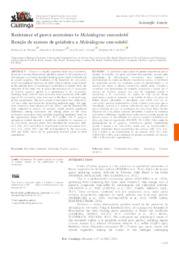Resistance of guava accessions to Meloidogyne enterolobii.
Resistance of guava accessions to Meloidogyne enterolobii.
Author(s): OLIVEIRA, P. G. de; QUEIROZ, M. A. de; CASTRO, J. M. da C. e; SILVA, M. M. P. da
Summary: Guava is a highly important fruit crop worldwide; however, a severe phytosanitary problem caused by the parasitism of Meloidogyne enterolobii has been limiting guava yields in Brazil and in several countries. The incidence of the nematode M. enterolobii results in significant decreases in yield, often resulting in plant death in the medium term. Considering a contribution to control tools, the objective of this study was to assess the resistance of 37 accessions of Psidium guajava grown in a greenhouse to M. enterolobii. Seedlings from seeds of each accession were inoculated with 4,000 eggs of M. enterolobii when they were at the three- to six-leaf stage, in two experiments. The root system of each plant was collected at 135 days after inoculation for extracting nematode eggs. The eggs were counted in three aliquots of 1 mL plant-1 , and the obtained data were subjected to analysis of variance, which showed significant differences among accessions and among plants of the same accession. Accessions were classified regarding resistance based on the reproduction factor (RF = Pf / Pi = 4,000). The P. guajava germplasm studied showed a significant variability in responses to M. enterolobii; resistant plants were identified for accessions A08, A15, A26, A13, and A30A in Experiment I and for accessions A31, A11, A16, A30A, GF3, and A08 in Experiment II; the accessions A08 and A30A stood out by presenting resistant plants in both experiments.
Publication year: 2024
Types of publication: Journal article
Unit: Embrapa Soybean
Observation
Some of Embrapa's publications are published as ePub files. To read them, use or download one of the following free software options to your computer or mobile device. Android: Google Play Books; IOS: iBooks; Windows and Linux: Calibre.
Access other publications
Access the Agricultural Research Database (BDPA) to consult Embrapa's full library collection and records.
Visit Embrapa Bookstore to purchase books and other publications sold by Embrapa.

